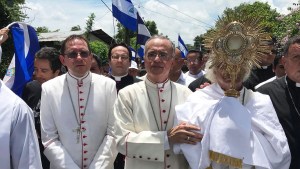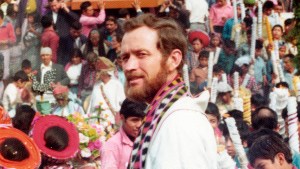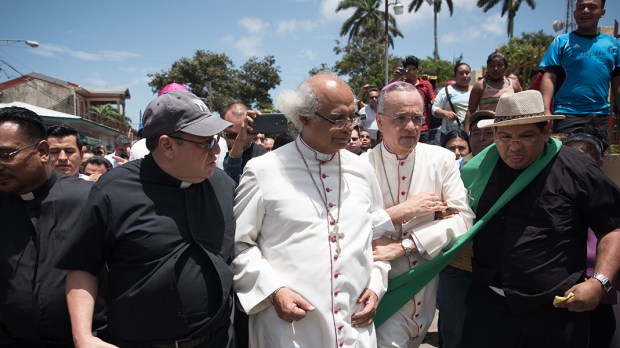Since mid-April, an estimated 280 people have been killed in Nicaragua and thousands more injured, as government-backed forces have clamped down on civilian protests. The country’s Catholic bishops have been trying to facilitate a national dialogue to restore peace, but the government has failed to meet basic requirements.
In a statement released June 17 on behalf of Pope Francis, the papal nuncio to Nicaragua, Archbishop Waldemar Sommertag, said that he and Pope Francis “weep for all the dead and pray for their families.”
“With all my human and spiritual strength, I appeal to the consciences of all to reach a truce and return quickly to a national dialogue to seek together an adequate solution to solve the crisis,” he said.
On the same day United Nations Secretary-General Antonio Guterres said in his own statement that the situation is complex, “but there is one thing that is obvious: there is a death toll that is shocking due to the use of force on the part of entities linked to the State, that is not acceptable.” While the UN says more than 280 people have died, the Archdiocese of Managua and Church sources say more than 360 people have been killed.
What brought about this violence? Among the issues:
President Daniel Ortega’s government announced changes to the county’s pension plan. Premiums would go up while monthly payouts would go down and retirees would have to pay out 5% of their monthly checks for medicare.
Pension reforms were just one more decision pushed through by the Ortega government that frustrated Nicaraguans.
Ortega is a former guerilla leader who ruled the country from 1979 to 1990. He returned to power in 2007. Opposition leaders have accused Ortega of manipulating elections to stay in power and build a family dynasty by making his wife vice president. During his current presidency he’s made decisions seen as benefiting foreign companies and his family, more than Nicaragua.
On April 18 a demonstration was held in Managua to protest the pension changes.
Paramilitary troops known as shock forces crushed the protest. Video of the event went viral and sparked outrage. Across Nicaragua, groups gathered to protest the violent repression of the Managua demonstration.
Of late, wherever protests take place, shock forces turn up to stamp them out with gunfire and reportedly even sharpshooters. The government has called the civilian protesters “terrorists” and accused them of killing, torture and kidnapping.
The bishops of Nicaragua immediately made a public appeal for all parties to engage in dialogue in order to restore peace. On April 23 the government asked the bishops of Nicaragua to act as mediators to facilitate that dialogue.
The bishops accepted on the condition that the government release anyone they’d captured, stop the paramilitary shock forces, safeguard freedom of expression and press, and reverse the pension reforms.
A hopeful start
The government agreed to these terms, and reversed the pension reforms on April 23. A National Dialogue began on May 16 at Managua’s Our Lady of Fatima seminary between the government and representatives of different civilian groups.
The paramilitary, however, did not stand down. In Masaya and Jinotega where some people were still protesting, government forces were capturing and imprisoning civilians.
At the same time bishops and priests started receiving death threats from what the country’s bishops called, “sectors of our society not accustomed to dialogue and who want to hold power in their hands.”
By May 23 the first round of dialogue came to an end with no resolution in sight.
Peace beyond reach?
On May 30, Mother’s Day in Nicaragua, a peaceful march turned deadly and Pope Francis made his first of three (so far) appeals for peace in the country.
But violence simply led to more violence and increasingly the Church was in the government’s crosshairs.
On July 9 the country’s bishops and the papal nuncio travelled to Carazo, which had been attacked by shock forces. During their visit to the local Basilica they were attacked by pro-government civilian groups.
Bishop Silvio Baez, the auxiliary bishop of Managua, tweeted, “I was besieged by an enraged mob that wanted to enter the Basilica of San Sebastian in Diriamba, I was wounded, hit in the stomach, they snatched my episcopal symbols and verbally assaulted me.”
A few days later, paramilitary circled and fired on Divine Mercy parish in Managua where a medical centre has been set up and university students had taken refuge after protests at their campus. The paramilitary held their position for two days.
Cardinal Leopoldo Brenes and the papal nuncio personally negotiated the release of those inside the church. Two journalists were among the wounded being treated at the parish.
Following the siege, the Nicaraguan bishops released a statement saying that through the dialogue process they had “witnessed a lack of will” on the government’s part to engage in sincere negotiations. The government had refused to address certain topics on the agenda that would lead to “real democratic change” and had failed to stop the paramilitary forces action against civilians.
In reply, the Ortega government said it would not negotiate with what it called the “opposition” until civilian protests stopped, claiming protesters were trying to overthrow the government. The UN’s Human Rights commission rejected that claim saying there was no unified opposition.
On July 16 the government passed a new anti-terror legislation with what UN observers call “very loose wording.” UN officials and observers were concerned the new law would be used to arbitrarily imprison civilians.
Seemingly at an impasse, the bishops of Nicaragua called for a national day of fasting and prayer in hopes that divine intervention might bring about peace again. The day is set for Friday, July 20, with the recommendation to call especially on the Archangel Michael, who vanquished evil.

Read more:
Bishops attacked by pro-government mob in Nicaragua

Read more:
Father Stanley Rother: The first American-born martyr

